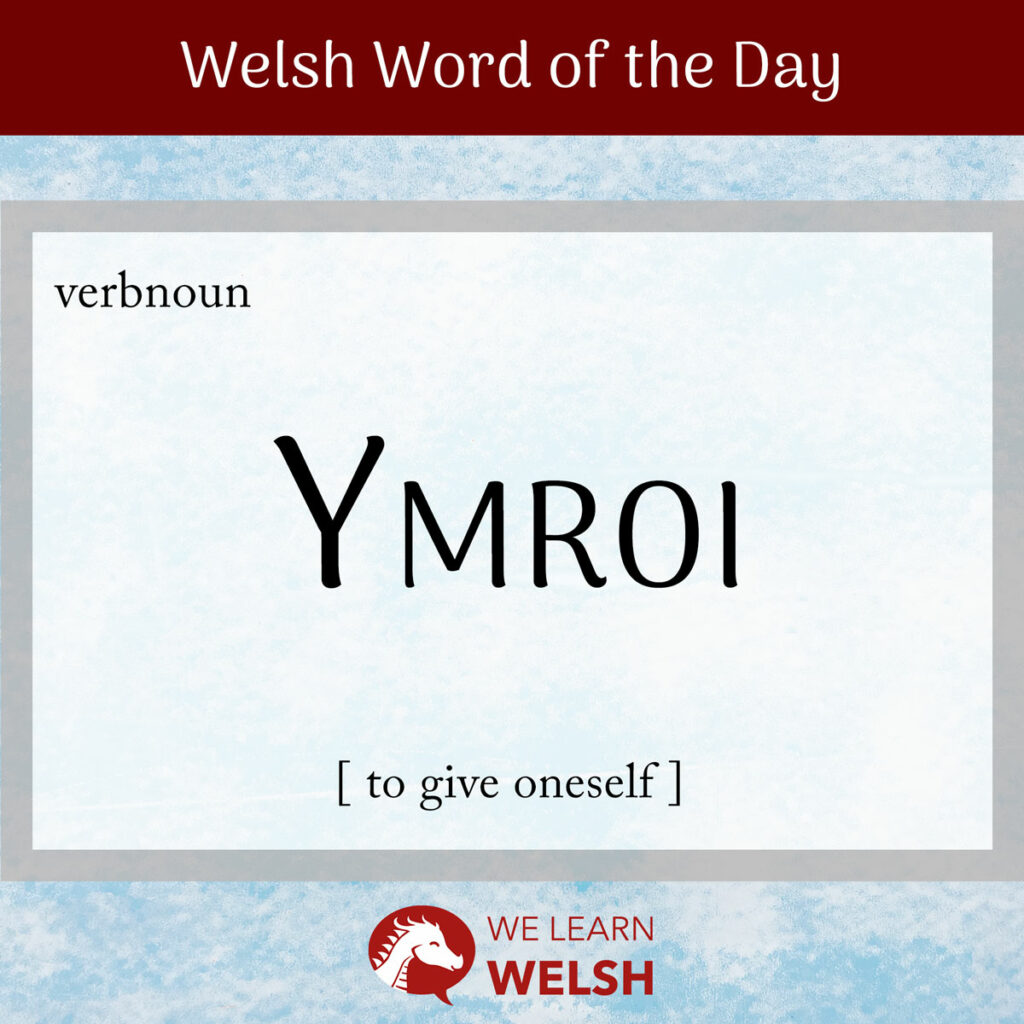One fascinating feature of the Welsh language is the use of reflexive verbs, which are formed by adding the prefix ym– to the beginning of a verb. This prefix indicates that the subject of the action is also its recipient, making the verb reflexive in nature.
Of course, words change over time, and some words with the ym– prefix have by now evolved to lose their reflexive meaning. A good example would be ymosod (to attack), which is not something you usually do to yourself!
Plenty of common Welsh words have evolved by adding ym– to another verb, and one example of this is the word ymroi.
ymroi
to give oneself
The most basic translation of ymroi is just what we’ve given here – to give oneself. But this is a pretty vague concept, right? In reality it’s used in a variety of senses, for example to mean to devote oneself to something, to indulge in something, or to give in to something. Overall, I think a good translation would be to give oneself over to.
What I like about it is that it expresses succinctly in one word a variety of meanings that in other languages you might need a whole phrase for.
As we discussed, ymroi comes from combining the reflexive prefix ym with the verb rhoi (to give). You might notice that we’re missing an h from the original rhoi. This is because as a prefix, ym causes a soft mutation to the second part of the word, which means that rh turns to r.
Rhoi itself is a really flexible word that you’ll need to use all the time when speaking Welsh. It even appears in some phrases that are semi-synonymous to ymroi. For example, the idioms rhoi’r gorau (literally to give the best) and rhoi’r ffidil yn y to (to put the violin in the roof) both mean to give up.
Of course, you can also use ymroi to mean almost the opposite of giving up, as in to devote oneself or to dedicate oneself, in which case more appropriate synonyms would be ymroddi, ymdrechu (to make effort) or ymrwymo (to commit oneself). Notice how they’re reflexive verbs too? They’re everywhere!
‘Nes i ymroi’n fodlon i’r dasg.
I gladly devoted myself to the task.

Often, words like this with confusing or contradictory meanings, or indirect equivalences to English, are the most vulnerable to being left behind or replaced with similar alternatives.
But in fact, words like ymroi have a continued and important presence in Welsh speakers’ conversations and culture. I was actually inspired to write this article after noticing the word while listening to one of my favourite Welsh-language pop songs!
The lyric in which it appears is this:
Y geiriau, wedi’w hen baratoi
Yn llifo allan bob yn un
A dwi’n plygu
Yn barod i ymroi
I ddangos bob un rhan o’n hun
The words, long-prepared
Are all flowing out as one
And I’m folding
Ready to dedicate myself
To showing every part of us
This whole song strikes a balance between the narrator’s anxiety and confusion about his path in life, and his commitment to expressing himself through creativity. And in fact, these lyrics use ymroi to create a clever play on words that can’t be fully conveyed by an English translation.
By pausing after the word ymroi, it sounds like the singer, Ifan Davies, is using the word in the sense to give up. This is especially true because he’s just used the word plygu (to bend) which is sometimes used in Welsh to mean to give way. But when he finishes the sentence by talking about dangos bob un rhan (showing every part) of himself, we realise he’s actually talking about taking the plunge and devoting himself to music.
Mae’r band yn bwriadu ymroi i gerddoriaeth.
The band are planning to devote themselves to music.
Clever, isn’t it? So I’d say this unique and versatile Welsh word is really worth getting to grips with. Here are some short phrases in which you could make use of it:
- ymroi ati = to get to doing something
- ymroi i astudio = to apply oneself to studying
- ymroi i weithio = to apply oneself to working
- ymroi i ffantasi = to indulge in a fantasy
- ymroi i arferiad = to indulge in a habit
- ymroi i ddiod = to be addicted to alcohol
- ymroi i ddiogi = to give up and become very lazy!

